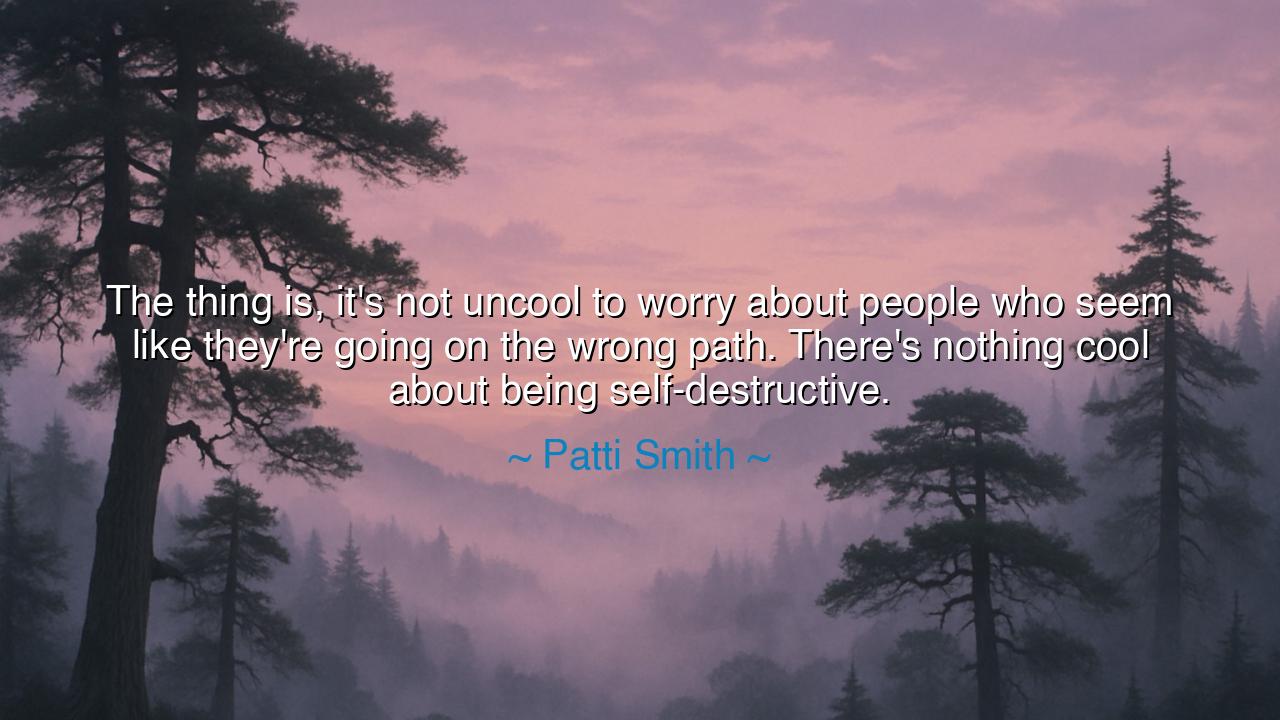
The thing is, it's not uncool to worry about people who seem like
The thing is, it's not uncool to worry about people who seem like they're going on the wrong path. There's nothing cool about being self-destructive.






"The thing is, it's not uncool to worry about people who seem like they're going on the wrong path. There's nothing cool about being self-destructive." These words from Patti Smith resonate deeply with the ancient wisdom about wisdom and self-preservation. In a world that often glorifies rebellion, chaos, and the reckless pursuit of pleasure, Smith reminds us that true coolness lies not in embracing self-destruction, but in recognizing the importance of caring for oneself and others. The temptation to adopt a nihilistic or self-destructive mindset is one that has been present throughout human history, but true strength and courage come from the ability to act with awareness, compassion, and a sense of personal responsibility.
In the ancient world, the concept of self-destruction was viewed as a tragic flaw, a sign of hubris that led to the downfall of great heroes and leaders. Greek tragedies, such as those written by Sophocles and Euripides, often depicted characters who, in their quest for greatness or freedom, made choices that ultimately led to their ruin. Consider the tragic tale of Oedipus, whose ignorance of his fate and his own actions led to his downfall. Oedipus is an example of how self-destructive behaviors—whether out of ignorance or defiance—lead to consequences far beyond what one can foresee. His story teaches us that recklessness, driven by pride or ego, only brings ruin, and in this way, Smith’s message echoes the ancient wisdom that true strength lies in understanding the impact of our choices on our lives and the lives of others.
The ancient philosophers, such as Aristotle, believed that living a virtuous life was the key to achieving happiness and fulfillment. For Aristotle, self-discipline, moderation, and the ability to act with rationality and forethought were essential components of the good life. He warned against extremes—whether in the form of indulgence or self-denial—because both could lead to personal destruction. Patti Smith’s words about worrying about others who are going down the wrong path align with this ancient idea of moral responsibility: we are not only responsible for ourselves but also for the well-being of those around us. If we care about others, we should not remain indifferent when we see them veering toward harm or self-destruction.
Consider the story of Socrates, who devoted his life to teaching the pursuit of wisdom and virtue. Socrates didn’t just engage in intellectual debate; he actively sought to guide others away from the path of ignorance and self-destructive behavior. His Socratic method—asking probing questions to challenge assumptions and encourage deep thought—was a way of steering people away from the dangerous allure of superficial knowledge and toward true self-awareness. Socrates believed that the greatest harm one could do was to allow oneself to be led astray by false beliefs or destructive habits, and he saw his mission as helping others avoid these pitfalls. Just as Smith advocates for worrying about those who are self-destructive, Socrates believed that we must engage in the lives of others, offering guidance and wisdom to prevent them from straying too far from the path of virtue.
In the modern world, this lesson remains just as relevant. We live in a time where self-destructive behaviors—whether through substance abuse, reckless living, or self-sabotage—are often romanticized or dismissed as mere acts of rebellion or freedom. The counterculture movements of the 1960s and 1970s, while full of innovation and social change, also carried with them a tendency to glorify self-destruction in the name of personal freedom. Patti Smith, as a figure who emerged from this period, understands the dangers of self-destructive behavior, and her words remind us that it is not cool to abandon oneself to chaos. True freedom comes not from disregarding the consequences of our actions but from embracing the responsibility to make thoughtful choices that preserve our well-being.
The lesson of Patti Smith’s quote is one of compassion and personal responsibility. Caring for others means not only offering love and support, but also helping them avoid the dangerous allure of self-destruction. Just as Socrates sought to guide others toward virtue, we too have a responsibility to speak up when we see others veering off course. It is not about judgment but about offering guidance, showing that real strength lies in empathy and the courage to intervene when necessary.
In practical terms, this means that we must not be afraid to care for the well-being of those around us, even when it is uncomfortable. We must recognize that self-destructive behavior is often a sign of deeper pain or confusion, and instead of turning away, we should reach out with compassion, offering our understanding and support. In our own lives, we must also be mindful of the paths we are walking, always striving to act in ways that promote our growth and well-being. Let us remember that true coolness lies not in rejecting responsibility or embracing recklessness, but in living with awareness, care, and a commitment to the health of both ourselves and those around us.






AAdministratorAdministrator
Welcome, honored guests. Please leave a comment, we will respond soon